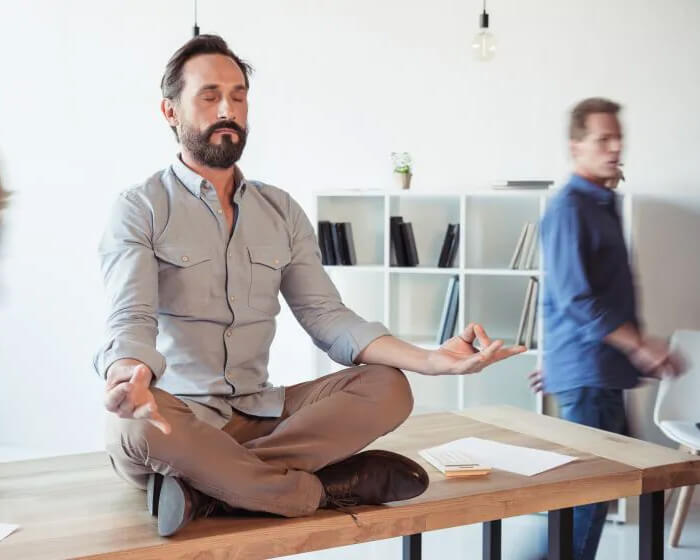Slowing Down to Speed Up: How Meditation Transformed My Work Day
 We’re conditioned to believe productivity means constant motion. But over the past three years, I’ve discovered something counterintuitive: my key to better performance has been learning when to pause. Meditation isn’t just wellness—it’s a business strategy that has fundamentally transformed not only how I work, but virtually every aspect of my life—for the better.
We’re conditioned to believe productivity means constant motion. But over the past three years, I’ve discovered something counterintuitive: my key to better performance has been learning when to pause. Meditation isn’t just wellness—it’s a business strategy that has fundamentally transformed not only how I work, but virtually every aspect of my life—for the better.
The Morning Reset
During these sessions, I focus on breath awareness and gentle mindfulness. As my mind settles, the mental fog lifts and scattered thoughts organize themselves. It’s like giving my brain a filing system for approaching challenges with focus and clarity.
My day now begins with twenty minutes of meditation instead of immediately checking emails. This isn’t about achieving some mystical state—it’s about creating mental clarity before the day’s demands take hold.
One liberating realization: it’s perfectly okay when your mind drifts during meditation. The goal isn’t perfect mental stillness—it’s noticing when thoughts wander and gently returning attention to your breath and peaceful thoughts. This simple act of noticing and returning is the practice, and it strengthens your ability to maintain awareness throughout the day.
The impact has been measurable and has deepened over three years of consistent practice. Tasks that once felt overwhelming now seem manageable. Complex decisions become clearer. I move through my to-do list with greater efficiency—not because I’m rushing, but because I’m genuinely more organized in my thinking.
Micro-Moments of Calm
The real game-changer has been integrating short meditation breaks throughout the workday. During stressful situations, I pause for brief mindfulness check-ins. Sometimes, just sixty seconds of conscious breathing serves as a reset button, quieting mental noise and allowing me to respond rather than react.
Perhaps most significantly, meditation has enabled me to reframe my thoughts about situations to the point where I rarely experience the stress I once felt. Even in moments when I do feel stressed, I can quickly reframe, regroup, and maintain composure.
Better Human Interactions
When I’m centered and present, I listen more deeply, have more patience with difficult clients, and respond to challenges with creativity rather than defensiveness. This shift improves not just my individual performance, but entire personal dynamics. I no longer get upset or dwell on meetings or interactions not going my way. Meditation has allowed me to free myself to greater extent from expectations.
The Paradox of Productivity
It sounds counterintuitive, but by regularly slowing down, I’ve actually sped up. Taking time to pause has made me more efficient. I make better decisions when my mind is clear, communicate more effectively when I’m present, and find I can navigate challenges with greater ease.
This isn’t a quick fix or something you do for a few months and then coast on the benefits indefinitely. Meditation is a lifelong, continual practice. However, it does become more engrained over time and gets easier than when starting out. After three years, I’ve developed a practical understanding that the benefits of taking these moments to pause far outweigh any gains I think I get by not slowing down and trying to grind my way through life.
Starting Small
If you’re skeptical, start with five minutes of morning meditation for one week. During your next stressful meeting, take three conscious breaths before responding. You don’t need special equipment or extensive training—just the willingness to pause and see what happens when you give your mind a moment to settle.
In a world that rewards constant motion, choosing to slow down is both radical and remarkably practical. The business world needs leaders who think clearly, communicate authentically, and respond with wisdom rather than reactivity. Meditation is one of the most effective tools for developing these essential skills.
